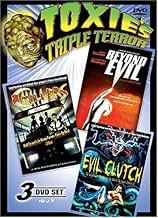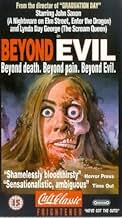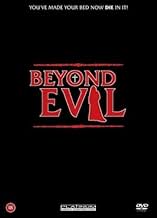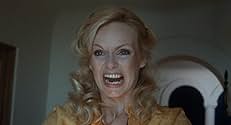IMDb RATING
4.2/10
1.2K
YOUR RATING
An architect and his wife move into a colonial mansion, where the demonic presence of the original owner's wife takes residence.An architect and his wife move into a colonial mansion, where the demonic presence of the original owner's wife takes residence.An architect and his wife move into a colonial mansion, where the demonic presence of the original owner's wife takes residence.
- Director
- Writers
- Stars
Mickey Caruso
- Construction Worker
- (as Mickey Carouso)
- Director
- Writers
- All cast & crew
- Production, box office & more at IMDbPro
Featured reviews
Your best pal arranges for you and your wife to move into an old house that, as legend would have it, is haunted by the spirit a woman who practised black magic and who returned from the dead to kill her philandering husband. What do you do?
If, like me, you have seen enough horror films to know that living in a house like that will seriously affect your life expectancy, you'll politely decline and book into a hotel. But if you're newlyweds John Saxon and Lynda Day George, you'll happily set up home in said haunted house, and not even bat an eyelid when creepy shizz starts happening.
Soon after settling in, Barbara Andrews (George) starts to act very strangely and, when hubby Larry (Saxon) isn't looking, she shoots green laser beams from her eyes. When Larry's friends and associates start to die in mysterious circumstances, he eventually cottons on to the fact that his wife's might have something to do with it, so he seeks help from local faith healer Dr. Solomon (David Opatoshu), who tells him that she is possessed.
Beyond Evil is an utterly abysmal supernatural horror that suffers from a cheesy plot that brings nothing new to the table, an awful central turn from George, and some really cheap visual effects (the day-glo green solarised effect is particularly nasty). Even the usually reliable Saxon cannot help make this one work. The only decent things about the film are a couple of reasonable gore effects (when the faith healer performs operations on his followers) and the Omen-esque score by Pino Donaggio.
If, like me, you have seen enough horror films to know that living in a house like that will seriously affect your life expectancy, you'll politely decline and book into a hotel. But if you're newlyweds John Saxon and Lynda Day George, you'll happily set up home in said haunted house, and not even bat an eyelid when creepy shizz starts happening.
Soon after settling in, Barbara Andrews (George) starts to act very strangely and, when hubby Larry (Saxon) isn't looking, she shoots green laser beams from her eyes. When Larry's friends and associates start to die in mysterious circumstances, he eventually cottons on to the fact that his wife's might have something to do with it, so he seeks help from local faith healer Dr. Solomon (David Opatoshu), who tells him that she is possessed.
Beyond Evil is an utterly abysmal supernatural horror that suffers from a cheesy plot that brings nothing new to the table, an awful central turn from George, and some really cheap visual effects (the day-glo green solarised effect is particularly nasty). Even the usually reliable Saxon cannot help make this one work. The only decent things about the film are a couple of reasonable gore effects (when the faith healer performs operations on his followers) and the Omen-esque score by Pino Donaggio.
Beyond Evil (1980) is a movie that I recently watched on Tubi. The storyline follows an architect and his wife who are tricked into living in a haunted mansion in a foreign country where the previous owner killed his wife. The locals hold voodoo rituals there and conjure spirits only making matters worse. The wife starts seeing things at the house but no one believes her...until it's too late.
This movie is directed by Herb Freed (Graduation Day) and stars John Saxon (A Nightmare on Elm Street), Lynda George (Mission Impossible), Michael Dante (Westbound) and Alan Caillou (The Ice Pirates).
The storyline for this picture was actually pretty interesting, unique for the horror genre and had some potential. Unfortunately, The execution wasn't as good as I would have liked. The horror elements, doll and kill scenes were very mediocre. The use of flashing lights to create intensity didn't work. The settings were good and there's a belly scene at the end that was fantastic and well created. The acting was solid, and Lynda George was great (and beautiful). I just wish they took the voodoo elements and kill scenes a step further.
Overall, this is a very average addition to the horror genre that I would score a 5/10 but recommend seeing once.
This movie is directed by Herb Freed (Graduation Day) and stars John Saxon (A Nightmare on Elm Street), Lynda George (Mission Impossible), Michael Dante (Westbound) and Alan Caillou (The Ice Pirates).
The storyline for this picture was actually pretty interesting, unique for the horror genre and had some potential. Unfortunately, The execution wasn't as good as I would have liked. The horror elements, doll and kill scenes were very mediocre. The use of flashing lights to create intensity didn't work. The settings were good and there's a belly scene at the end that was fantastic and well created. The acting was solid, and Lynda George was great (and beautiful). I just wish they took the voodoo elements and kill scenes a step further.
Overall, this is a very average addition to the horror genre that I would score a 5/10 but recommend seeing once.
Beyond Evil represents an ambitious but ultimately misguided attempt to transplant gothic horror sensibilities to an exotic Filipino island setting. The film follows an architect who suspects his wife is possessed by a former resident of the historic colonial mansion they have just moved into, but what should have been a compelling supernatural thriller instead becomes a textbook example of how good intentions and adequate resources cannot compensate for fundamental storytelling deficiencies. The tropical backdrop provides an interesting visual contrast to traditional haunted house narratives, yet the film consistently undermines its own atmospheric potential through overwrought performances and questionable creative choices.
John Saxon delivers a workmanlike performance as Larry Andrews, the concerned husband who gradually realizes his new bride may be under malevolent influence. Saxon's natural screen presence and professional demeanor help ground the increasingly ridiculous proceedings, though even his considerable skills cannot elevate material that seems determined to veer toward unintentional comedy. Lynda Day George faces the more challenging task of portraying Barbara's transformation from loving wife to vessel for supernatural revenge, and while she commits fully to the role's physical demands, the script provides little psychological foundation for her character's journey.
The film's most significant problem lies in its tonal inconsistency and inability to generate genuine suspense. The supernatural elements, including "green, laser-blasting eyeballs" and other optical effects, often feel more ridiculous than frightening. Freed's direction shows clear influence from Italian gothic horror films of the 1960s, but lacks the visual poetry and atmospheric control that made those works effective. The pacing suffers from extended sequences that feel more like padding than dramatic development, particularly during the middle act when the possession storyline should be building momentum.
The horror elements prove disappointingly light, offering suspense rather than genuine scares, which might have been acceptable if the film had committed to being a psychological thriller instead of promising supernatural terror. The supporting cast, including Michael Dante as the duplicitous business partner Del and David Opatoshu as the mystical Dr. Solomon, provides adequate backup but cannot overcome the script's fundamental weaknesses. Mario Milano as the local contact Albanos brings some authentic regional flavor to the proceedings, though his character serves more as exposition delivery than genuine personality.
The film's production values remain consistently professional, with the Philippine locations providing genuinely beautiful backdrops that the cinematography captures competently. The mansion itself becomes an effective character, its colonial architecture suggesting histories of exploitation and violence that the supernatural elements attempt to literalize. However, the musical score tends toward overwrought melodrama that telegraphs every emotional beat, robbing scenes of subtlety and genuine tension.
Despite these considerable flaws, "Beyond Evil" occasionally succeeds in creating moments of genuine unease, particularly when focusing on the gradual dissolution of Larry and Barbara's relationship under supernatural pressure. The film's exploration of possession as metaphor for loss of identity within marriage shows glimpses of thematic sophistication that a more focused approach might have developed effectively.
John Saxon delivers a workmanlike performance as Larry Andrews, the concerned husband who gradually realizes his new bride may be under malevolent influence. Saxon's natural screen presence and professional demeanor help ground the increasingly ridiculous proceedings, though even his considerable skills cannot elevate material that seems determined to veer toward unintentional comedy. Lynda Day George faces the more challenging task of portraying Barbara's transformation from loving wife to vessel for supernatural revenge, and while she commits fully to the role's physical demands, the script provides little psychological foundation for her character's journey.
The film's most significant problem lies in its tonal inconsistency and inability to generate genuine suspense. The supernatural elements, including "green, laser-blasting eyeballs" and other optical effects, often feel more ridiculous than frightening. Freed's direction shows clear influence from Italian gothic horror films of the 1960s, but lacks the visual poetry and atmospheric control that made those works effective. The pacing suffers from extended sequences that feel more like padding than dramatic development, particularly during the middle act when the possession storyline should be building momentum.
The horror elements prove disappointingly light, offering suspense rather than genuine scares, which might have been acceptable if the film had committed to being a psychological thriller instead of promising supernatural terror. The supporting cast, including Michael Dante as the duplicitous business partner Del and David Opatoshu as the mystical Dr. Solomon, provides adequate backup but cannot overcome the script's fundamental weaknesses. Mario Milano as the local contact Albanos brings some authentic regional flavor to the proceedings, though his character serves more as exposition delivery than genuine personality.
The film's production values remain consistently professional, with the Philippine locations providing genuinely beautiful backdrops that the cinematography captures competently. The mansion itself becomes an effective character, its colonial architecture suggesting histories of exploitation and violence that the supernatural elements attempt to literalize. However, the musical score tends toward overwrought melodrama that telegraphs every emotional beat, robbing scenes of subtlety and genuine tension.
Despite these considerable flaws, "Beyond Evil" occasionally succeeds in creating moments of genuine unease, particularly when focusing on the gradual dissolution of Larry and Barbara's relationship under supernatural pressure. The film's exploration of possession as metaphor for loss of identity within marriage shows glimpses of thematic sophistication that a more focused approach might have developed effectively.
I am a sincere horror movie fan. As such, I am extremely forgivingindeed, my friends would argue I have no standards at all. To shake up this dynamic even more, there is a class of film that forgiving fans feel compelled to huddle around and protect because these "works of art" are so obviously vulnerable to attackmostly because they suck in every way imaginable. Remember Robert Culp crazily running around naked in "A Name for Evil?" (Whoever says anything nice about "A Name for Evil?") Remember a coiffed Richard Moll attempting to navigate the discontinuity in "The Nightmare Never Ends?" (What dozen or so people ever bothered watching "The Nightmare Never Ends" in its entirety?) How about Trish Van Devere flitting about the badly lit sets in her housecoat in "The Hearse?" Technically, these films are inconceivably bad, plain and simple. They never really gel; they don't scare; the characters are flat or unconvincing; the lighting is poor; the sound is cacophonous; the plot convoluted. These movies always seem to be a collection of medium-range shots pasted haphazardly togethernot an interesting angle or lighting effect to be found. These films don't even fall into the clichéd "so bad they're good" class of films.
In my mind, films like "A Name for Evil" are "TV quality" films (if we are talking TV quality of about 30 years ago, of course). In fact, the most effective way to turn me off from wanting to watch any film is by telling me it is of average TV quality. To me, that means artless, white-washed, vanilla, predictable, flat. I'm immediately disinterested.
Having said that, films like "The Hearse" and "Nightmare Never Ends" and even "A Name for Evil" almost supernaturally, are imbued with something greater than the sum of their parts. In the minds and hearts of truly forgiving horror movie fans, these films hold a place that they do not deserve; there's something about the "idea" of the movienot borne out by the reality of the film itselfthat exerts an inexplicable power. I guess what I'm saying is that these movies are never as good as the ideas behind them; but for some reason I, as viewer, seem to remember and connect with the idea, rather than the movie. Call me insane, but it is almost as if the movie doesn't matter. For example, when I spy the DVD cover of "Horror Planet" on my shelf, I think of the "idea" of the film fondlyeven though I never really want to watch the film a second time because it is so poorly executed. I imbue it with a power it doesn't really have. And I'm fascinated by that interaction. Maybe I'm just nuts.
Now, having said all that, I'm not sure "Beyond Evil" quite makes it into that mysterious class of films. The ideas in this film (not the film itself) try damn hard to work their way into my subconscious but ultimately the flick fails in that regard. The acting is adequate, even adequately inspired at times. The music by Donaggio is adequate. The plot is okay. But when it comes right down to it, I think there are three specific things that ultimately do this movie inthings that are so completely distracting, I can't even love the idea of this film, let alone the film itself:
1. Could You Repeat That Please: The film takes place in a large mansion, mostly. Here we get the "one Radio Shack mic placed in the middle of the cacophonous room" effectoften with more than one person speaking at the same time. Remember the award-winning audio in films like "The Ghosts of Hanley House?" Terribly distracting. As someone else also said, this movie is evidence why filming in front of an airport is not such a good ideadid you catch that dialog? I didn't. Planes are loud and noisy. Someone tell the director.
2. The Editor Fell Asleep at the Cutting Wheel: Something bizarre happens in the last 15 minutes of this movie (referring to the UK PAL R2 DVD). Suddenly parts of the film disappearthere are plot elements you KNOW occurred, you'd bet your paycheck on it, but they've been sliced to the point where the narrative starts to literally come apart at the seams. Once again, I am a forgiving fan here and can even appreciate discontinuity on some artful level. But this isn't epileptic enough to be interesting or keep me off balance. No, it's just that somebody let the scissors slip a few times, and the film falls apartliterallyin the last few frames. Why oh why?
3. Attack of the Special Effects: The effects in this movie, as other reviewers have adequately illustrated, are atrocious. Remember, I am a forgiving fanprobably much more forgiving than you are. But when you see something so low--that you start to think you might actually have standards of some kindyou know you've hit rock bottom. The effects are really at rock bottom. They are so bad, they chew into the narrative. While watching, I was having a conversation with myself (as the movie progressed) about how the ghost of the former owner of the mansion could have been presented so much better, and so much more simply. Glowing green laser beam eyeballs. Awful, awful, awful. The silly superimposition of the ghost character that suddenly blinks into life on a dark space in the picture's frame. Awful, awful, awful. I think of all the scary movies I've seen where ghosts were presented simply and interestingly and frighteningly without a special effect to be found. Why would adequate-director-Herb-Freed make such a bad, bad decision?
So there you have it. An unforgivable "TV Quality" movie where ultimately the ideas don't even float to the top. Too bad, too bad.
In my mind, films like "A Name for Evil" are "TV quality" films (if we are talking TV quality of about 30 years ago, of course). In fact, the most effective way to turn me off from wanting to watch any film is by telling me it is of average TV quality. To me, that means artless, white-washed, vanilla, predictable, flat. I'm immediately disinterested.
Having said that, films like "The Hearse" and "Nightmare Never Ends" and even "A Name for Evil" almost supernaturally, are imbued with something greater than the sum of their parts. In the minds and hearts of truly forgiving horror movie fans, these films hold a place that they do not deserve; there's something about the "idea" of the movienot borne out by the reality of the film itselfthat exerts an inexplicable power. I guess what I'm saying is that these movies are never as good as the ideas behind them; but for some reason I, as viewer, seem to remember and connect with the idea, rather than the movie. Call me insane, but it is almost as if the movie doesn't matter. For example, when I spy the DVD cover of "Horror Planet" on my shelf, I think of the "idea" of the film fondlyeven though I never really want to watch the film a second time because it is so poorly executed. I imbue it with a power it doesn't really have. And I'm fascinated by that interaction. Maybe I'm just nuts.
Now, having said all that, I'm not sure "Beyond Evil" quite makes it into that mysterious class of films. The ideas in this film (not the film itself) try damn hard to work their way into my subconscious but ultimately the flick fails in that regard. The acting is adequate, even adequately inspired at times. The music by Donaggio is adequate. The plot is okay. But when it comes right down to it, I think there are three specific things that ultimately do this movie inthings that are so completely distracting, I can't even love the idea of this film, let alone the film itself:
1. Could You Repeat That Please: The film takes place in a large mansion, mostly. Here we get the "one Radio Shack mic placed in the middle of the cacophonous room" effectoften with more than one person speaking at the same time. Remember the award-winning audio in films like "The Ghosts of Hanley House?" Terribly distracting. As someone else also said, this movie is evidence why filming in front of an airport is not such a good ideadid you catch that dialog? I didn't. Planes are loud and noisy. Someone tell the director.
2. The Editor Fell Asleep at the Cutting Wheel: Something bizarre happens in the last 15 minutes of this movie (referring to the UK PAL R2 DVD). Suddenly parts of the film disappearthere are plot elements you KNOW occurred, you'd bet your paycheck on it, but they've been sliced to the point where the narrative starts to literally come apart at the seams. Once again, I am a forgiving fan here and can even appreciate discontinuity on some artful level. But this isn't epileptic enough to be interesting or keep me off balance. No, it's just that somebody let the scissors slip a few times, and the film falls apartliterallyin the last few frames. Why oh why?
3. Attack of the Special Effects: The effects in this movie, as other reviewers have adequately illustrated, are atrocious. Remember, I am a forgiving fanprobably much more forgiving than you are. But when you see something so low--that you start to think you might actually have standards of some kindyou know you've hit rock bottom. The effects are really at rock bottom. They are so bad, they chew into the narrative. While watching, I was having a conversation with myself (as the movie progressed) about how the ghost of the former owner of the mansion could have been presented so much better, and so much more simply. Glowing green laser beam eyeballs. Awful, awful, awful. The silly superimposition of the ghost character that suddenly blinks into life on a dark space in the picture's frame. Awful, awful, awful. I think of all the scary movies I've seen where ghosts were presented simply and interestingly and frighteningly without a special effect to be found. Why would adequate-director-Herb-Freed make such a bad, bad decision?
So there you have it. An unforgivable "TV Quality" movie where ultimately the ideas don't even float to the top. Too bad, too bad.
Larry and Barbara Andrews (John Saxon and Lynda Day George) move into their new mansion only to find it haunted. We know it's haunted due to an opening tipoff scene, and also because the Andrews' are treated to a story / flashback of the previous owners, a sorceress named Alma and her idiot husband.
Now, Alma's back, and she's pi$$ed!
BEYOND EVIL is a preposterous tale of supernatural non-terror. The creepier it tries to be, the funnier it gets! Alma is a riot with her green, laser-blasting eyeballs and leering theatrics!
Be sure to listen for the overwrought musical score and "demonic" chanting!
BEST SCENE: The self-destructing Cadillac!
Drop whatever your doing and watch this right now!...
Now, Alma's back, and she's pi$$ed!
BEYOND EVIL is a preposterous tale of supernatural non-terror. The creepier it tries to be, the funnier it gets! Alma is a riot with her green, laser-blasting eyeballs and leering theatrics!
Be sure to listen for the overwrought musical score and "demonic" chanting!
BEST SCENE: The self-destructing Cadillac!
Drop whatever your doing and watch this right now!...
Did you know
- TriviaDirector Herb Freed got along so well with Lynda Day George that he cast her husband, Christopher George, in his next film, Graduation Day (1981).
- Crazy creditsThe concluding credits roll over Casa Fortuna at night as a couple of rooms within have their lights on.
- Alternate versionsWhen originally released theatrically in the UK, the BBFC made cuts to avoid an 'X' rating. All cuts were waived in 1993, when the film was granted a '15' certificate for home video.
- How long is Beyond Evil?Powered by Alexa
Details
- Release date
- Country of origin
- Language
- Also known as
- Beyond Evil
- Filming locations
- Castillo del Lago Los Angeles, California, USA(Hollywood Hills castle where Madonna lived in the 1990s)
- Production companies
- See more company credits at IMDbPro
- Runtime
- 1h 34m(94 min)
- Sound mix
- Aspect ratio
- 1.85 : 1
Contribute to this page
Suggest an edit or add missing content





























